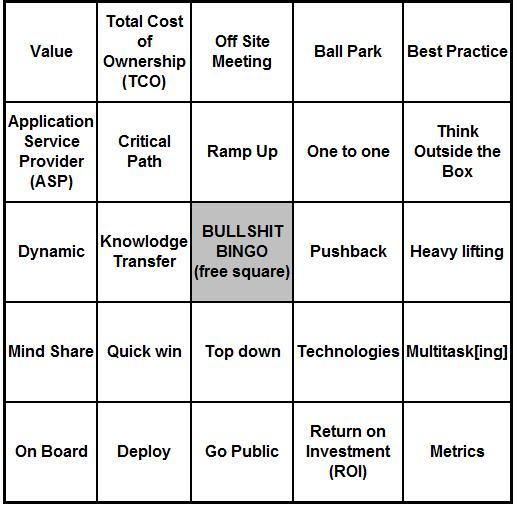
A lot of people have joked about the horrible and hollow language that people use in business. There is the game of bullshit bingo for those who want to pass the time in boring meetings (pictured above). And a couple years back I blogged about Polly LaBarre's brilliant term to define the entire mess, jargon monoxide. Lots of business terms bother me, largely because, although they once actually meant something, they now seemed to be used by people who don't actually know what they mean or the phrases are just plain worn-out. I have used a trick for years when I suspect that people are spewing out jargon but don't know what they are talking about. I ask them to define their words — it is amazing how often they can't do it. I still remember the executive who got mad it me years ago when I asked him to define a "simultaneously loose-tight organization," which was from Peters and Waterman's In Search of Excellence. I think it means, essentially, that management tries to control a few critical things but leaves a lot of other things unconstrained. But I am still not entirely sure and that touchy manager had no idea what he was talking about.
In any event, I have been especially annoyed lately by three phrases, in part, because I keep hearing them used by students who have limited, if any, business experience and in ways that seem misguided.
Leverage: This is of course what got a lot of homeowners with sub-prime loans and their banks in trouble. But the way I keep hearing it used, at least is by people who want to do as little as possible and get as much back as possible. This can be a good way to make money, but last year a student used it to explain why he was doing so little work and his team was doing so much, he called it "leveraging my team members' talents." A pretty fancy way to say he was lazy as hell.
Value Added: This term is based on a noble concept, that one's efforts or ideas should add value. We all want that. But I keep hearing it used as a euphemism for "what is in it for me?" It hasn't happened to me, but a number of colleagues in business schools have had students come up after a class, announce the amount that they had paid for the last hour or two of class (perhaps a couple hundred bucks?) and then say "the value added for my time isn't worthwhile." I am not arguing that people should waste their time, but as I have noted before, viewing time as money does very bad things to your mind — it turns people into selfish jerks.
Core Competence: This is a word that is just plain worn out, although it seemed to mean something when it appeared in the great book, Competing for the Future. But the meaning has been squeezed out of it, and while doing what you are good at, and leaving the rest to others, is often a wise move in business and life, it still grates on my nerves because I have heard it used in ways that Hamel & Prahalad could never have imagined or wanted. I tend to use it only in sarcastic ways now, such as when I claimed that GM' core management competence was explaining why they couldn't change, the "no we can't" mindset.
These words sound like fingernails on the chalkboard to me… which ones drive you crazy or which should be banished?